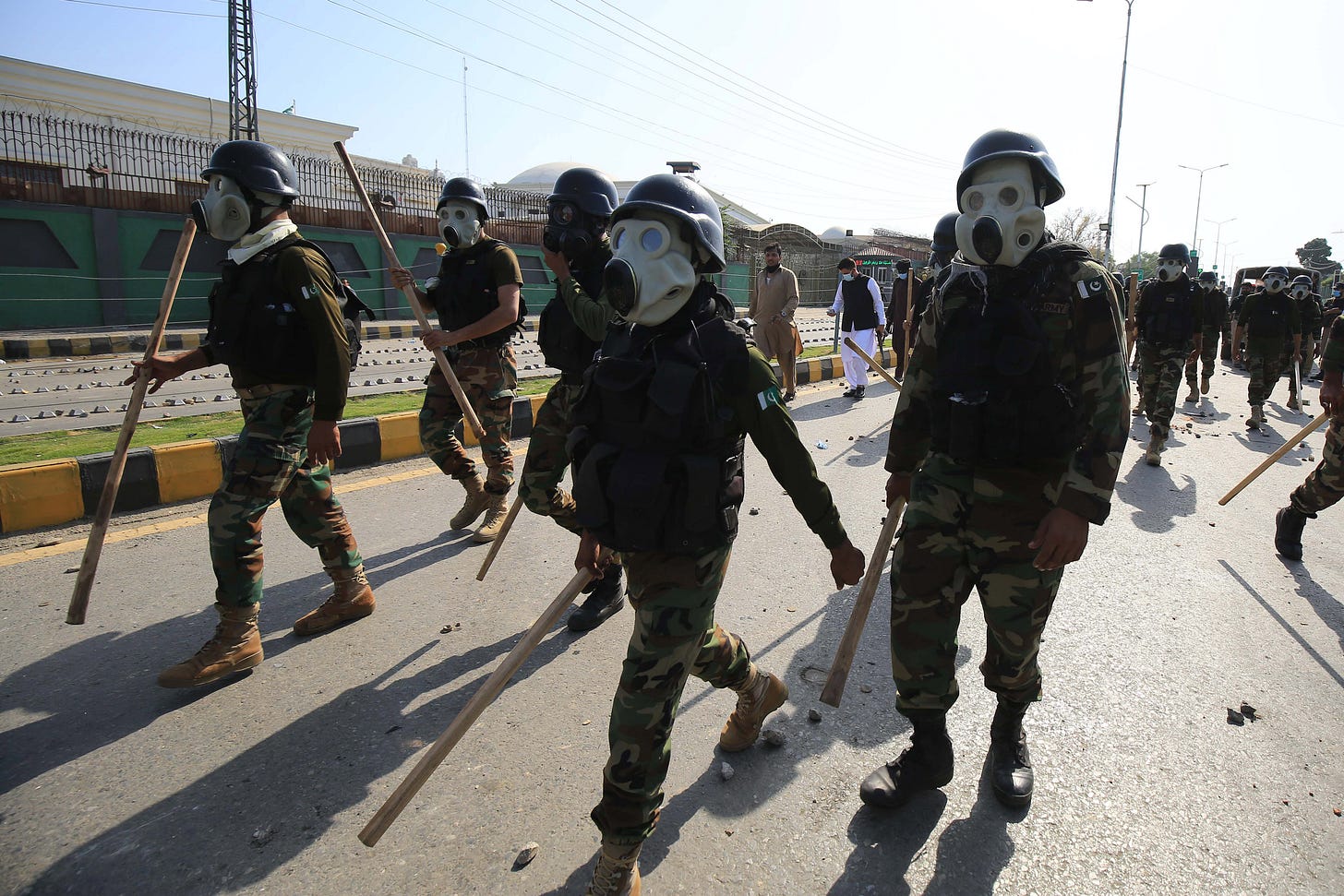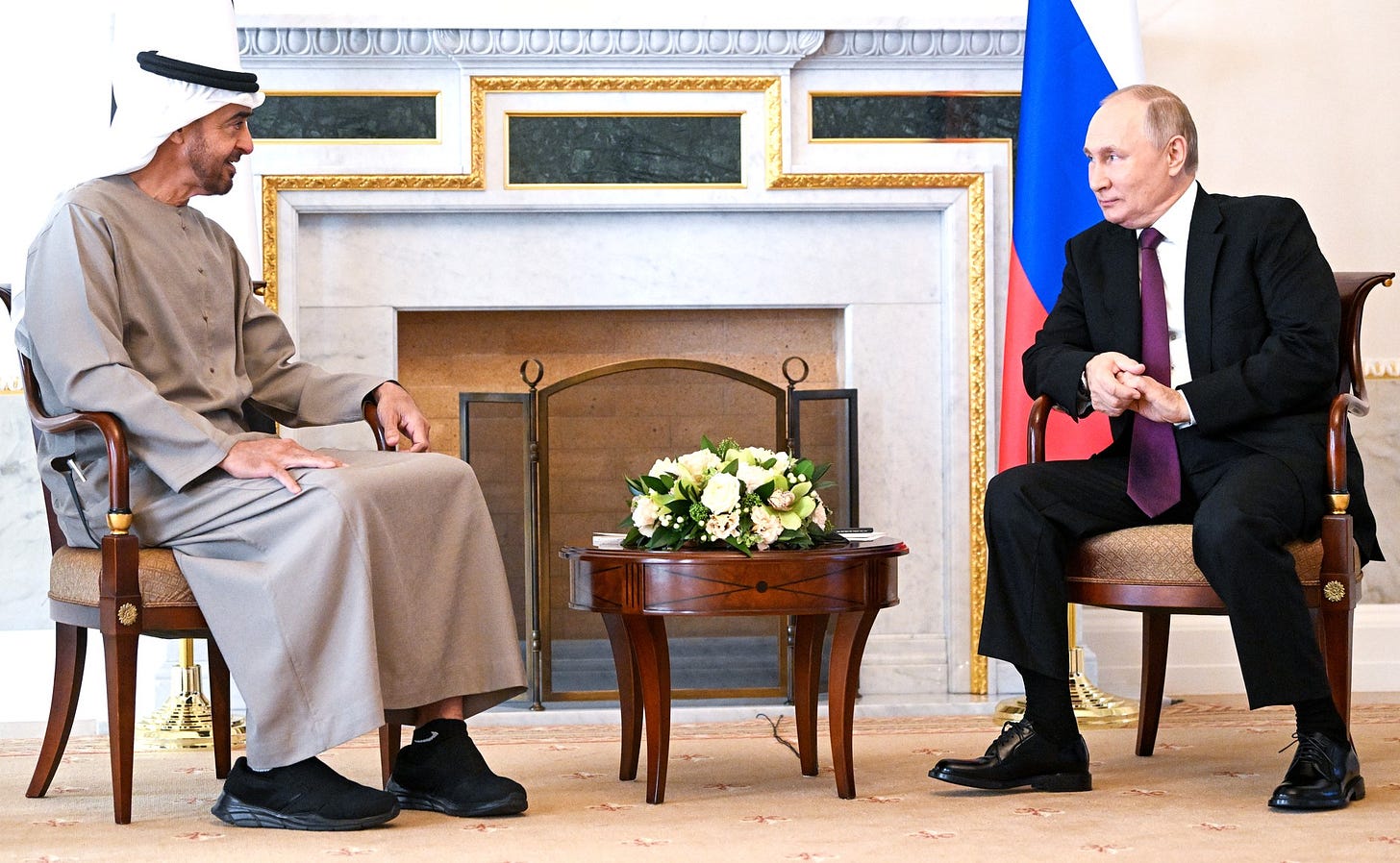The U.S. isn't behind everything, but it isn't innocent either
The Imran Khan leaks and recent debates over Turkey in Syria reveal how U.S. power influences events indirectly.

The U.S. State Department was caught misleading people twice over the past week. First, a spokesman claimed that Turkey was not engaged in “demographic change” — a nicer word for ethnic cleansing — in occupied Syrian territories. Second, a leaked cable revealed that the U.S. government had threatened Pakistan with “isolation” unless its parliament ousted (former) prime minister Imran Khan. For months, the State Department had been calling Khan a loony conspiracy theorist for suggesting that U.S. diplomats lobbied for his overthrow.
The two incidents reveal how U.S. power works indirectly in other countries. The United States’ critics often conjure up conspiracies, with American agents behind every world event. U.S. leaders, on the other hand, like to portray Washington as a gentle giant, struggling to react to world events it did not want and cannot control. Both views confuse the way U.S. power works in reality: by getting into other people’s conflicts and putting a large weight on one side of the scale.
When American diplomats speak, there’s serious implied power behind their words. Washington provides a lot of aid and sells a lot of weapons to other countries. And the U.S. government sets the rules of the global financial system. A few sentences in an obscure policy document can remove billions of dollars from a country’s economy, or add massive firepower to its army.
Turkey and Pakistan have similar relationships to U.S. power. They received extensive U.S. military aid during the Cold War and War on Terror, which has cultivated a pro-American officer class. (These officers have also launched coups at crucial points in history, with a wink and a nod from Washington.) At the same time, Turkey and Pakistan are large independent states that often clash with U.S. interests. Managing those relationships is a subtler game than dealing with submissive puppets or open enemies.
The biggest U.S.-Turkish clash in recent years came during Turkey’s October 2019 invasion of Syria. The U.S. military had been backing Kurdish-led rebels against the Islamic State for years. Turkey opposed those rebels, which it saw as an extension of its internal Kurdish rebellion. In late 2019, the Trump administration green-lit what it saw as a limited Turkey operation against the Syrian Kurdish rebels, but Congress vehemently objected and threatened Turkey with sanctions. The Trump administration eventually pushed Turkey to freeze the invasion.
Turkey’s earlier invasion of Syria was little-discussed in American media. In early 2018, the Turkish military attacked the Syrian Kurdish enclave of Afrin. (Unlike the October 2019 areas, the U.S. military does not operate in Afrin.) The Trump administration publicly shrugged its shoulders and Congress stayed mostly silent. Turkish forces remain there to this day, and have largely outsourced control of the area to lawless Syrian militias.
Many of Turkey’s militias came from the ranks of the old Syrian opposition, including rebels previously armed by the CIA or trained by the U.S. military. Washington opposes these militias’ current role in the occupation, and has sanctioned one of them, Ahrar al-Sharqiya, on human rights grounds.
Even this condemnation is less consistent than it appears. Ahrar al-Sharqiya never received U.S support, and once threatened American troops. Egregious war criminals who did take U.S. aid, like the Hamza Division, have not been sanctioned. The Hamza Division’s crimes are well known — even acknowledged in State Department documents — but its past U.S. ties and its close relationship to Turkish intelligence seem to reduce Washington’s appetite to punish the militia.
The Turkish occupation drove out much of Afrin’s Kurdish majority, and Turkey has encouraged people (and forced refugees) from elsewhere in Syria to move in. The Kurdish Peace Institution, where I am a non-resident fellow, and the independent journalist Alexander McKeever have meticulously documented this process, which amounts to the ethnic cleansing and resettlement of occupied territory. Turkey’s own President Recep Tayyip Erdoğan has said he wants to change the ethnic balance of Afrin.
These practices kill three birds with one stone. First, the Turkish government can portray its occupation as a humanitarian gesture to protect refugees, essentially using them as human shields. Second, it can keep those refugees out of Turkey, at a time of widespread anti-immigrant feeling and anti-Arab racism. Third, the influx of Syrian Arabs and Turkmen creates a pro-Turkey constituency in Afrin, diluting the social base for Kurdish parties.
If the U.S. State Department described this process in terms of “systematic human rights violations” — let alone “war crimes” or “ethnic cleansing” — then it would open the door to legal measures, like weapons restrictions or economic sanctions. Washington had been willing to use those measures against Turkey before, but doesn’t want to play its cards at this moment. So the State Department’s spokesman has to maintain the fiction that Turkey is not trying to “change the demographics of Afrin.”

The second American untruth was less blatant, but may have had bigger consequences. Pakistan’s former leader Imran Khan, who was ousted by parliament and then arrested on corruption charges in early 2022, has accused the United States of helping engineer a coup against him. Although the United States has denied any role or interest in the outcome of Pakistani elections, The Intercept obtained a secret cable from the Pakistani military showing that the U.S. government moved against Khan at a critical moment.
The classic U.S.-backed coup was Chile’s 1973 military putsch. The United States had spent months trying to undermine the elected government of Salvador Allende. President Richard Nixon ordered his underlings to “make the [Chilean] economy scream” in response to Allende’s election, and met with Chilean powerbrokers to organize anti-Allende plots. Eventually, the Chilean military bombed the presidential palace, dissolved parliament, and began rounding up Allende’s supporters for execution.
Pakistan’s recent change of government appears to have been quite different. Most importantly, Pakistan’s parliament voted Khan out (and a new prime minister in) through legal procedures. The Pakistani military appears to have been the driving force behind the move, for entirely domestic reasons. The United States did not “make the Pakistani economy scream” before Khan’s ouster, and so far, there is no evidence of the vast U.S.-led conspiracy that Khan has alleged.
However, the United States certainly did bring its power to bear against Khan. According to the leaked cable, assistant secretary of state Donald Lu told Pakistan’s ambassador in March 2022 that “isolation of [Khan] will become very strong from Europe and the United States,” but “all will be forgiven in Washington” if Khan were removed.
In some ways, the cable is more of a smoking gun than anything to come out of Chile. Although there are documents showing Nixon wanted a coup, there is no written evidence of Nixon telling the Chilean military when to go ahead. In the Pakistani case, the Biden administration not only wanted Khan gone, but also communicated specifically that they wanted parliament to pass a no-confidence vote.
That message was read far outside the foreign ministry. (After all, the cable was eventually leaked by a member of the Pakistani military.) Lu is no naïf, and had to have known that his words would circulate among Pakistan’s elite. Nor was his threat of “isolation” something to take lightly. U.S. pressure unfolds gradually, then suddenly.
What starts as disappointed statements from Washington can escalate without warning into full-blown economic and military siege. In the mid-1990s, cold U.S.-Burmese relations quickly turned into a heavy U.S. sanctions campaign against Burma aimed at regime change. Around the same time, Washington went from treating Iran as one bad actor among many to portraying Iran as the cancerous root of all evil in the Middle East.
Pakistani politicians had plenty of motives to remove Khan. The prospect of punishment or reward from the world superpower made those motives all the more urgent. The U.S. gaslighting campaign also helped dim Khan’s chances. While Khan talked about diplomatic cables and U.S. pressure, Washington made him sound like an unhinged liar.
Since then, Pakistani journalists have been disappeared or killed while reporting on the cables. It fits a broader pattern of repression — which, to be clear, is not U.S.-funded or directed — by the post-Khan government. Khan has been able to mobilize popular support against his removal and subsequent arrest. The new government has reportedly responded with censorship and torture.
The rationale for Washington’s intervention is quite revealing as well. As the Russian invasion of Ukraine began, Khan refused to cancel a long-planned visit to Russia. According to the cable, Lu said that the West was “quite concerned about why Pakistan is taking such an aggressively neutral position (on Ukraine), if such a position is even possible. It does not seem such a neutral stand to us.” After Khan’s ouster, Pakistan’s new government began supplying weapons directly to Ukraine.
While many Western politicians wonder why the post-colonial world is reluctant to side with Ukraine — after all, Ukraine is a former Russian colony being punished for breaking free — much of the Global South sees Ukraine as a stick to beat them with. Pakistan has suffered serious, life-and-death economic consequences from the war. Yet the United States refused to accept Pakistan’s neutrality, calling the idea impossible.
Ironically, other U.S. partners have supported Russia’s war effort more actively, without facing such consequences. Saudi Arabia raised oil prices at exactly the time it would benefit Russia. The United Arab Emirates has helped Russian institutions hide money, and even let Russian arms dealers set up shop on its territory. While Turkey has sold weapons to Ukraine, it has similarly opened an economic lifeline to Russia.

Turkey has gotten away with its neutrality, and the Arab states have actually been rewarded for cozying up to Russia. The Biden administration, worried about “losing” its Arab partners, has rushed to offer them extremely generous security guarantees.
Saudi Arabia and the Emirates are rich countries with many friends in Washington, and Turkey is a NATO member, part of the Western club. Pakistan is a poor country in the Global South, one that Washington can “afford” to flex its muscles on. Of course, Pakistan’s nuclear arsenal means that Americans have to tread carefully when doing so.
American diplomats are not stupid or ignorant. Nor are they always puppetmasters. They don’t have to be. If there’s some distance between them and the consequences of their actions, all the better.


